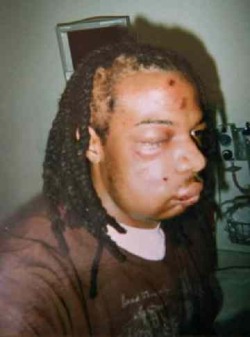Nearly All White Jury Empaneled in Miles Case: Trial begins in Pittsburgh Police Beating Case of Unarmed Black Teen
/ From [HERE] and [HERE] Jury selection in the federal civil rights trial of three white undercover police officers accused of beating and wrongfully arresting an 18-year-old black student at the city's performing arts high school appeared to be moving swiftly Monday. Most of the jury questioning was conducted in U.S. District Judge Gary Lancaster's chambers. The judge had previously ordered that, indicating potential jurors would be more forthcoming when asked about their knowledge of the case and any racial or other biases they might hold if they were not asked such things in open court.
From [HERE] and [HERE] Jury selection in the federal civil rights trial of three white undercover police officers accused of beating and wrongfully arresting an 18-year-old black student at the city's performing arts high school appeared to be moving swiftly Monday. Most of the jury questioning was conducted in U.S. District Judge Gary Lancaster's chambers. The judge had previously ordered that, indicating potential jurors would be more forthcoming when asked about their knowledge of the case and any racial or other biases they might hold if they were not asked such things in open court.
Jordan Miles, now 20, claims the officers accosted, chased and beat him for no reason other than he was a young black man walking in a high-crime area. The jury consists of six jurors and two alternate jurors. Lawyers for both sides selected them from 65 people whom the court called for jury duty from 13 counties in Western Pennsylvania. Out of the total jury pool only three were black, all men. The eight person jury selected has only one black person; five are men and three are women. Apparently there are no Latino jurors.
Jordan claims undercover officers approached him without articulable suspicion. Officers chased him when he ran and when they caught up with him they beat him into submission by delivering violent blows that left his face swollen and distorted. Police also used a stun gun and pulled out a chunk of his hair. The officers put him in handcuffs, and repeatedly shoved his face into the snow, causing a piece of wood to impale his gums, Miles has said. He is 5-foot-6 and 150 pounds and was unarmed. No weapons were found. He suffers from permanent brain damage. [MORE]
The jurors were asked in open court whether they knew any of the witnesses or parties in the trial, including the plainclothes officers being sued, Richard Ewing, Michael Saldutte and David Sisak.
After that, the jurors were questioned individually in chambers about any other factors that might keep them from being among the eight jurors who will hear the case. Although criminal court juries have 12 jurors, smaller juries are allowed to hear civil cases. The officers were investigated by the FBI and the Department of Justice, which declined to charge them criminally, as did the local district attorney.
The officers were suspended shortly after Miles was beaten on Jan. 12, 2010. Police Chief Nathan Harper later reinstated them, saying an internal investigation found "insufficient evidence to prove or disprove the allegations made by Mr. Miles."
The officers have argued they were justified in confronting Miles, and then using force to subdue him after he ran away and struggled with them, because he looked like a prowler and appeared to have a gun in his coat pocket. The officers contend what they thought was a gun turned out to be a soda bottle.
But Miles claims he didn't even have the bottle, and police have been unable to produce it, saying it was thrown away.
Miles contends he resisted police because they didn't identify themselves and he thought he was being robbed or otherwise accosted.
Attorneys indicated they expect to have a jury selected by Tuesday, after which they'll give opening statements at what's expected to be at least a two-week trial. Miles, the officers, Harper and other police brass are expected to testify.
The city already has paid Miles $75,000 to settle his claims against the police department and has agreed to indemnify the officers, meaning it could pay more damages on behalf of the officers should the jury agree they violated Miles' civil rights.





































































































































































































































































